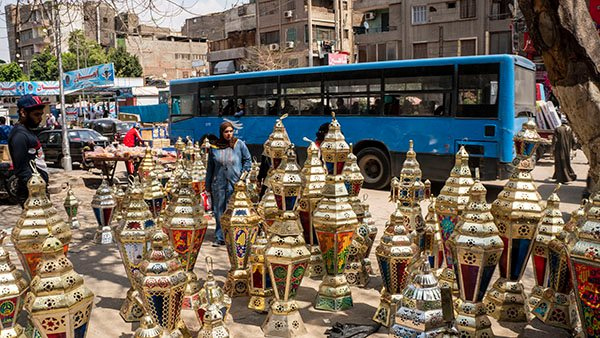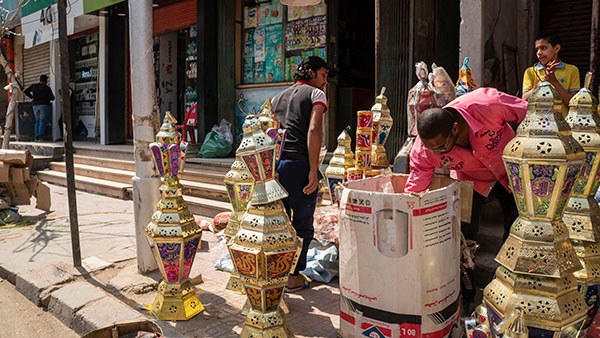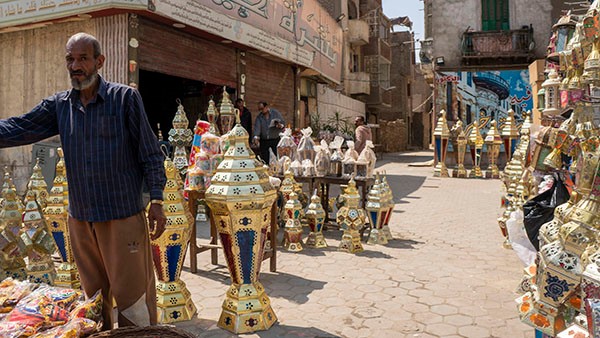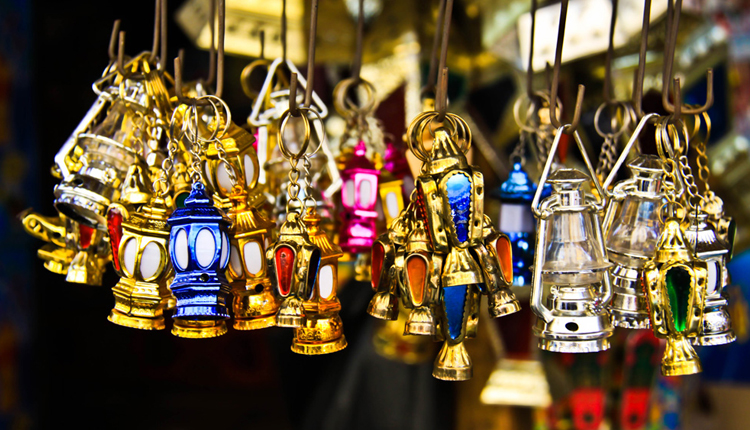In her 20 years selling traditional lanterns, Yousra has never seen a season like this one. “This is the worst year ever,” she told Ahram Online on Friday.
Yousra, who is in her late sixties, was sitting on a plastic chair on a street corner in central Cairo, in front of an array of traditional Ramadan lanterns of different sizes.
Her stall is located next to El-Sadd Street, the location of the well-known Sayeda Zeinab lantern market.
For years, if not decades, El-Saad Street, located behind the historic Sayeda Zeinab Mosque, has hosted the city’s biggest annual market for Ramadan lanterns and Ramadan food supplies.
The market typically pops up about three weeks before the start of the holy month, which begins this year on 23 April.
This year is different. Public gatherings are banned, mosques have been shuttered, traditional Ramadan events like charity banquets have been forbidden, and a nighttime curfew has been implemented, in an attempt to tackle the spread of the coronavirus.
Egypt has so far recorded 2,673 cases of the virus, including 196 deaths.
In mid-March, the government gave a hint of what was to come when it cancelled the Sayeda Zeinab moulid, which also took place in El-Sadd Street. It also closed the mosque and shrine, surrounding the building with security barricades.
 Egyptian Ramadan Lanterns for sale in Sadd street , El-Sayida Zeinab in Cairo (Photo: Zeinab El-Gundy)
Egyptian Ramadan Lanterns for sale in Sadd street , El-Sayida Zeinab in Cairo (Photo: Zeinab El-Gundy)
“There is no market this year and all the Ramadan lantern workshops are already closed because of the curfew; here, one of men working in the workshop has been sitting with us since early morning,” Yousra told Ahram Online, pointing out a young man sitting in another plastic chair, watching over the lanterns.
The old lady, who had her baby granddaughter on her lap, told the young man to greet two women who seemed interested in buying a large lantern made of coloured glass and tin, featuring the photo of renowned Muslim scholar Sheikh Matwally El-Sharawawi.
“The price is EGP 150,” she told the young man, adding to Ahram Online that the women were her first customers of the day.
A year before, a large lantern would have been sold at a starting price of EGP 250 or EGP 300.
Moving along the street, Ahram Online found Mohamed, who, like Yousra, is a regular at the Sayeda Zeinab Ramadan market, and has also been forced to make adjustments.
“There are no customers because there is no market, as the district refused to give us the permit to have the market, as you can see, because they do not want any kind of assembly,” he told Ahram Online while trying to spread his merchandise quickly on the pavement with the help of a young boy, who brought him boxes full of lanterns and decorations from a nearby warehouse in a crumbling building.

“It is the toughest year without a doubt. The lantern workshops have been closed for a week now because of the curfew,” he told Ahram Online, before heading over to a customer who had stopped in her car to buy the traditional Ramadan khayamiya-patterned decorations.
It was a relief for Mohamed, who had had few customers since the start of the day.
The walk down the street continued and led Ahram Online to a major warehouse of a lantern-seller and trader who sells to other shops.
The owner of the warehouse did not speak much as he was supervising the transfer of some large lanterns onto trucks. The only thing he said when approached by Ahram Online was that it was tough time, both for local lantern-makers and for the importers of Chinese plastic lanterns.
Although Egypt issued a decision banning the import of Chinese-made plastic lanterns a couple of years ago, to preserve the traditional lantern-making industry and protect it from extinction, the import of the plastic lanterns seems to have continued.
Egyptian shops will this year depend on last year’s stock due to a lack of supply from Chinese factories, which have been hit hard by the coronavirus.

The warehouse owner’s assistant, who was organising another a makeshift stall of lanterns, told Ahram Online that he feared that his hard work would be futile and that municipality workers would come to remove the stall.
“Nevertheless, we as lantern-sellers agreed to organise a small market in the upcoming two weeks in a side street, away from the main street, so it will not be dispersed,” he told Ahram Online.
Ramadan lanterns, or “fanous” in Arabic, first appeared in the tenth century, when Egyptians welcomed Fatimid Caliph Al-Muizz Li-Din Allah at night during Ramadan. They subsequently became a traditional holiday toy for children.
Currently, the handmade Ramadan lantern industry is located in Sayeda Zeinab district, in an ancient street called “Taht Al-Raba,” where the lantern-makers inherit the profession and their workshops from their father and grandfathers.
According to news reports, Egypt produces nearly 5 million lanterns for Ramadan annually.
Ahram Online headed to one the big Ramadan lantern retailers located in Port Said Street near Taht Al-Raba to find out more about the current situation.
Khaled, who is in his mid-sixties, is the owner of one the biggest shops in the street, selling both to customers and to other shops in Cairo.
“It is a tough year; we are using all we had in the warehouse, including last year’s stock,” he told Ahram Online.

Asked about the workshops, Khaled told Ahram Online that they had been closed for four days.
“The workers can’t work because of the curfew,” he said.
“Already you see my shop and how I showcase all my stock; I have to close by 4pm at the latest so we can return to our homes,” he told Ahram Online, adding, however, that there are still some customers who want to buy lanterns.
